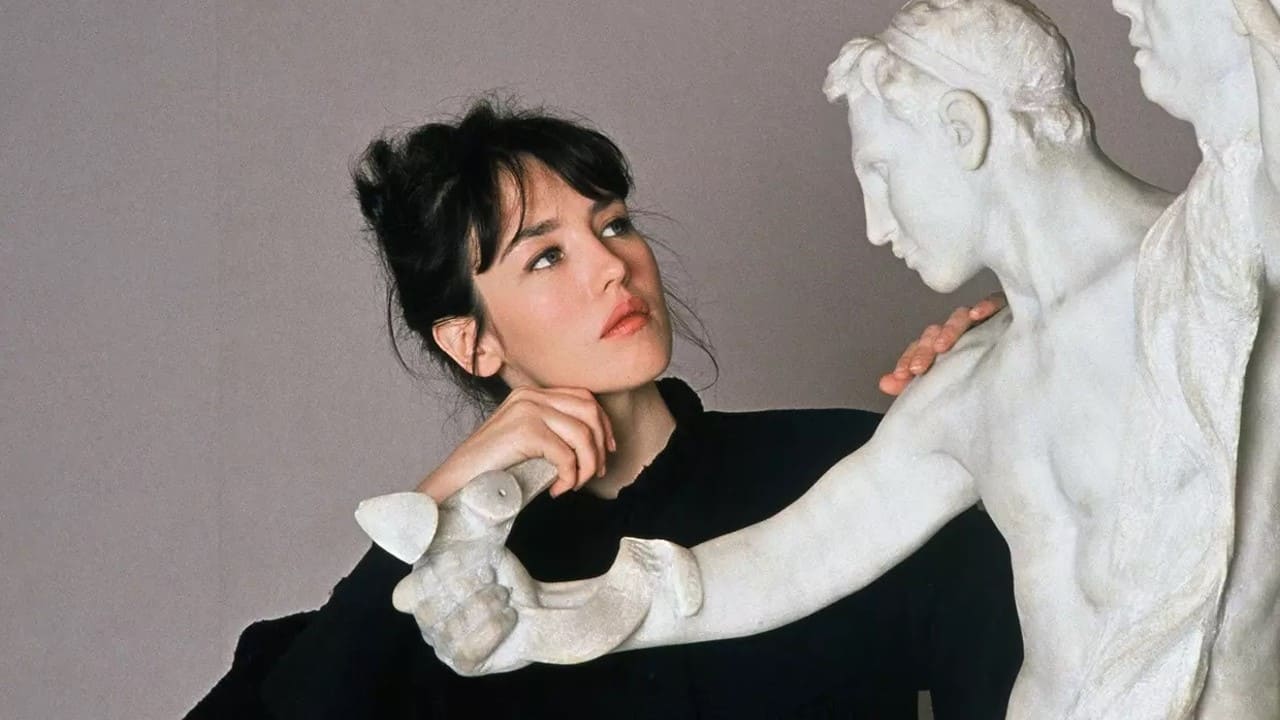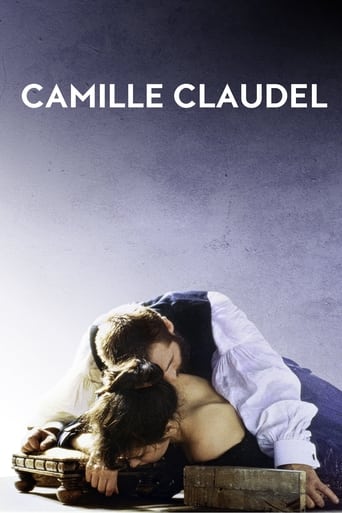Nonureva
Really Surprised!
ScoobyWell
Great visuals, story delivers no surprises
Billie Morin
This movie feels like it was made purely to piss off people who want good shows
DVR_Brale
You might want to ask yourself what is wrong with a particular society. There are several ways to approach that question one of which is observing scars society (together with culture) inflicts on you and other people. One major difficulty with that approach is distinguishing between ones' emotional problems and real cultural problems. That difficulty is what we are faced with when watching Camille Claudel.A brilliant young sculptress starts going mad after going through a tragic romantic experience. We see so many talent and potential wasted at such an early age in such a sad way. Immediately we question is there always a simple and reliable explanation for such a tragic failure. Her behavior inflicts her family and almost everybody around her. She becomes obsessed with sculpting; what has now become her religion. She's tormented by hypocrisy of French bourgeois. We see many factors being taken into account in re-telling her story - something we see very rarely in American cinematography.Back to the question. She undoubtedly is going mad but the reason behind it stays mystery for us. Not only for us but her family as well. Camille doesn't even realize how mistaken she is and she is eventually hospitalized for the rest of her life. That's the genius behind this biographical drama: nobody knows what is happening inside Camille's heart. Her genius and fragility cannot be analyzed; she's taken them into her grave. Nevertheless we may conjecture about it and at best learn a thing or two.It's obvious that playing this role is delicate. Isabelle Adjani is absolutely gorgeous here; one of the most beautiful female characters ever - that is until she goes demented. She was able to appear as an undivided personality in a sense that her happiness and failures are not disconnected from each other but form an unanimous whole. Only Ellen Burstyn's role in Requiem for a Dream is this impressive although she takes much less screen time. Other members of the cast have been very successful in communicating complex emotions too.I've always held that atmosphere and spirit is what makes a movie memorable and convincing. Seeing this drama was for me more than a movie experience - it gave me a deeper insight about French esprit libre. I strongly recommend this movie to all of you who are looking for a movie not made for pure fun but for reflection.
dromasca
The year is 2017, Camille Claudel is back in town and she seems to go through a revival and reevaluation of her work and short artistic career. A museum dedicated to her life and art opened in March in the small French town of Nogent-sur-Seine, and the museum includes many of the works that survived the agitated 20th century and the destruction by the artist's own hands. Books are being written about her, and art history starts to take her seriously into account. Before this however, there were the films, and especially this one Camille Claudel from 1988. It is not exaggerated to say, I believe, that the film prepared her comeback to the world of arts.Camille Claudel deals more with the character of Camille Claudel, her love story with Auguste Rodin, her relationship with her brother Paul, one of the important French poets of the first half of the 20th century than with her art. Actually one of the few critical observations one may have about the visual part of the film is that there is so little art in it, and from the film we cannot make to ourselves an idea about how good she was. We see an artist fighting with her material, we see a woman fighting prejudice in a world and at a time when women were far from being recognized as equal professionally to men, even less in arts. We see the young woman and artist falling under the fascination of her master and being torn between love and admiration for him, and the need to express herself, to be herself. We see her falling down the spiral of vanity and then madness, and it's up to us to judge whether the roots of her fall are in the social environment, in the attitude of her lover who may be a great artist but is also a womanizer and small human being in terms of relations, or in her own vanity and narcissism. Add to this the ambiguity of the relationship to her brother, and we can now understand the willingly or not, the focus of the script and director Bruno Nuytten was on her personal path rather than on her art.For Bruno Nuytten this was the first film as director, but he already had in 1988 a long career as cinematographer, including a few superb films by Claude Berri. Not everything works or better said, not everything stood the almost 30 years since the film was made. Isabelle Adjani is superb, beautiful and ambitious, a fighter but fragile at the same time, turn between love and vanity. This is one of her best roles. Gérard Depardieu is very fit to Rodin's role, at that time his physical qualities were also perfect and added to his huge talent. The cinematography of the film (signed by Pierre Lhomme ) is excellent, and there are many scenes to remember - in the studio where Rodin and Claudel are shown fighting with the material from which they extracted their works, and out in the nature with clear allusions to the period of the Impressionists when this film is set. On the other hand the soundtrack is horrible. The use of violin music which would have been exaggerated even for a melodrama made in 1938, it's simply a disaster for this film about art and artists made in 1988. Add to this the poor quality of the sound (at least in the copy screened by ARTE TV) which makes half of the dialog incomprehensible even when it is not covered by violins. Maybe digital sound re-working will sometimes in the future save this film. It is highly deserved.
gavin6942
Biography of Camille Claudel. The sister of writer Paul Claudel, her enthusiasm impresses already-famous sculptor Auguste Rodin. He hires her as an assistant, but soon Camille begins to sculpt for herself and for Rodin. She also becomes his mistress. But after a while, she would like to get out of his shadow...Women as artists is an interesting topic. As with just about every field, men have long been the dominant ones, and women have been left out of history. This seems very strange with regard to artists, though. Why are almost all the famous artists men? You don't need schooling, it's not necessarily a "job". Anyone with talent and free time can be an artist.Claudel, I confess, is not someone I knew. But, I didn't know her brother either. If not for Rodin, this whole world presented in the film would be foreign to me. Mayhaps I need to brush up on European artists between the wars?
Michael Neumann
The familiar line dividing creativity and madness narrows and disappears in this downbeat but dramatic biography of the 19th century sculptress, who after meeting Auguste Rodin went from apprentice to mistress to madwoman, driven to the asylum and professional obscurity by her inability to escape from under the shadow of her celebrated lover. Isabelle Adjani gives the title character a headstrong, stubborn vitality that turns electrifying as she loses her sanity; in contrast, Rodin (pronounced by an associate "the biggest lecher since Victor Hugo") fades into the background clay, and not even the reliable Gerard Depardieu can flesh out the underwritten role. The film is beautifully produced, and even at such a punishing length (almost two and a half hours) the pace never flags. It moves twice as quickly as any film half its length, using a brisk, hopscotch style that almost seems rushed trying to get all the facts in.

